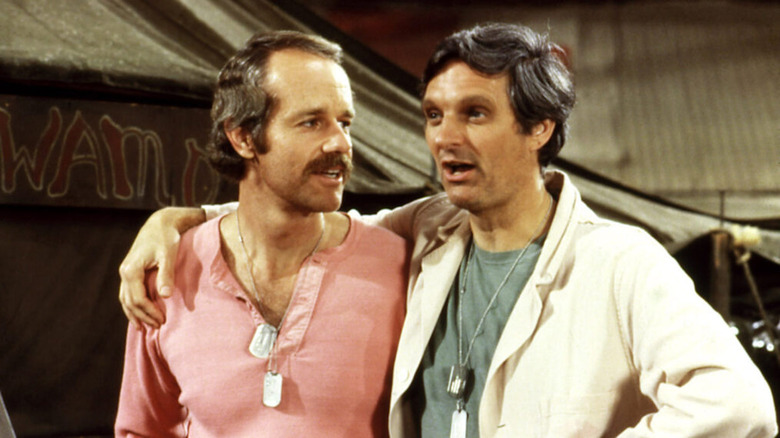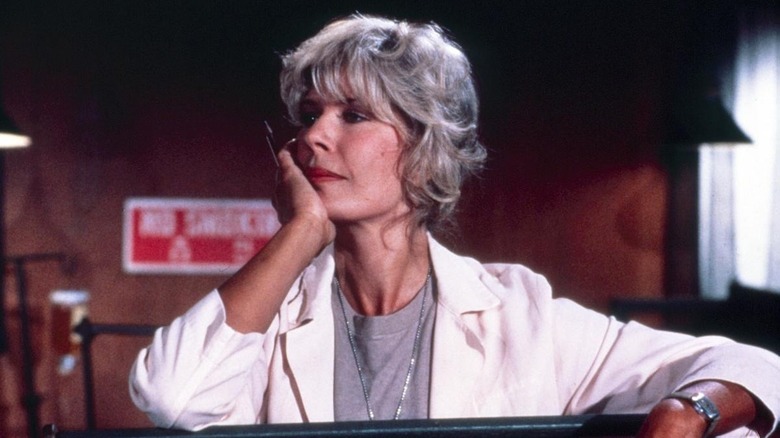The One Aspect Of M*A*S*H That Writer Larry Gelbart Felt 'Cheapened' The Show
Robert Altman's "M*A*S*H" is an uproariously funny anti-war masterpiece on par with the Marx Brothers' "Duck Soup." Set at a Mobile Army Surgical Hospital during the Korean War in 1951, but released to theaters in 1970, Altman's movie was unmistakably commenting on the ongoing meat grinder that was the Vietnam War. One second you're howling at the decidedly un-PC antics of Army surgeons Benjamin "Hawkeye" Pierce (Donald Sutherland) and "Trapper" John McIntyre (Elliott Gould), and the next you're cringing as blood spurts from the wounded soldiers they're endeavoring to save.
This sui generis classic did not feel like grist for a TV sitcom spinoff (à la "The Odd Couple" or "Please Don't Eat the Daisies"), but somehow series creator Larry Gelbart was able to strike an authentic, network-friendly balance between the rebellious behavior of Hawkeye and company, and the soul-deadening savagery of war. The CBS series aired for 11 years, seven years longer than the conflict in which it was set, and is as watchable today as it was when it signed off in 1983. It was an at times painfully sincere show, and, given that it premiered three years before the end of the Vietnam War, Gelbart wanted it to stand out from other sitcoms of the era.
The show was such a ratings success that CBS was inclined to let Gelbart have his way. But the network insisted on one obligatory convention: "M*A*S*H" had to have a laugh track. Gelbart had no choice but to accept this, but he did so begrudgingly.
Dead people laughing about dying people
In an interview with the Archive of American Television, Gelbart, who passed away in 2009, groused over the need for an artificial laugh track:
"The laugh track was always a thorn in our side. The laugh track, as we know, is a holdover from radio days, when live people came into a studio and laughed out loud at live performances they saw the actors giving, with microphones in front of them. Well, television, was in the beginning run by broadcasting people and they brought that tradition over."
You might recall watching sitcom reruns where, at the outset of each episode, one of the cast members informs the viewer that, for example, "'Happy Days' is filmed in front of a live studio audience." This was all well and good for a three-camera show, which was shot and staged to run like a piece of live theater, but "M*A*S*H" was a single-camera sitcom. They were working on a soundstage without an audience. So once each episode was completed, Gelbart and the series' producers/directors would have to go into a mixing studio and advise the editors as to the intensity of the laughter. As he told the Archive of American Television:
"All of these laugh tracks are primarily, these days, of dead people. These are people who left a long time ago, and are still laughing, only they don't know it. I always thought it cheapened the show. I always thought it was out of character with the show."
Ultimately, CBS agreed.
The day the canned laughter died
Gelbart left "M*A*S*H" after season four. The final episode to air under his aegis was "The Interview," which was shot documentary style as a means of conveying the non-jokey reality our favorite characters inhabit. It's a shattering piece of television, and Gelbart successfully lobbied for the exclusion of a laugh track in this instance.
He also won minor skirmishes along the way. There was no canned laughter permitted in operation room scenes. Once he departed, the network eased up. Over the last six seasons, there are several episodes that eschewed the laugh track altogether — most notably the 135-minute series finale, which still stands as one of the most-watched broadcasts in television history.
Amazingly, networks were still insisting on laugh tracks well into the 1990s. The first season of Aaron Sorkin's single-camera dramedy "Sports Night" was saddled with the device before executives came to their senses and realized it was gratingly inorganic. Nowadays, just about everything is single-camera and devoid of canned laughter. And thank god. At long last, those dead chortlers Gelbart spoke of can rest in unamused peace.


